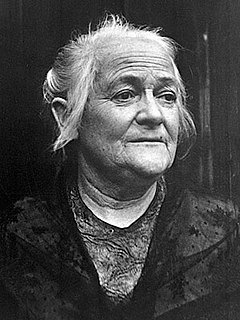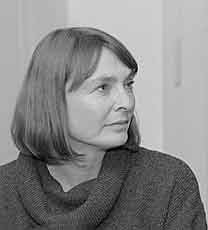
East Germany, officially the German Democratic Republic, was a country that existed from 1949 to 1990, when the eastern portion of Germany was part of the Eastern Bloc during the Cold War. It described itself as a socialist "workers' and peasants' state", and the territory was administered and occupied by Soviet forces at the end of World War II — the Soviet Occupation Zone of the Potsdam Agreement, bounded on the east by the Oder–Neisse line. The Soviet zone surrounded West Berlin but did not include it; as a result, West Berlin remained outside the jurisdiction of the GDR.
Utopia and dystopia are genres of speculative fiction that explore social and political structures. Utopian fiction portrays the setting that agrees with the author's ethos, having various attributes of another reality intended to appeal to readers. Dystopian fiction is the opposite: the portrayal of a setting that completely disagrees with the author's ethos. Many novels combine both, often as a metaphor for the different directions humanity can take, depending on its choices, ending up with one of two possible futures. Both utopias and dystopias are commonly found in science fiction and other speculative fiction genres, and arguably are by definition a type of speculative fiction.

In Marxist philosophy, cultural hegemony is the domination of a culturally diverse society by the ruling class who manipulate the culture of that society—the beliefs, explanations, perceptions, values, and mores—so that their imposed, ruling-class worldview becomes the accepted cultural norm; the universally valid dominant ideology, which justifies the social, political, and economic status quo as natural and inevitable, perpetual and beneficial for everyone, rather than as artificial social constructs that benefit only the ruling class.

In Marxist philosophy, the term dominant ideology denotes the attitudes, beliefs, values, and morals shared by the majority of the people in a given society. As a mechanism of social control, the dominant ideology frames how the majority of the population thinks about the nature of society, their place in society, and their connection to a social class.

Social imperialism can mean either of two types of left-wing phrases. The term has political and academic meanings that are quite different.

Clara Zetkin was a German Marxist theorist, activist, and advocate for women's rights.

Katja Lange-Müller is a German writer living in Berlin. Her works include several short stories and novellas, radio dramas, and dramatic works.
The Kleist Prize is an annual German literature prize. The prize was first awarded in 1912, on the occasion of the hundredth anniversary of the death of Heinrich von Kleist. The Kleist Prize was the most important literary award of the Weimar Republic, but was discontinued in 1933.
As with many Soviet-allied countries prior to the fall of the Berlin Wall, the government of the former German Democratic Republicapplied wide censorship during its existence from 1949 to 1990.
East German literature is the literature produced in East Germany from the time of the Soviet occupation in 1945 until the end of the communist government in 1990. The literature of this period was heavily influenced by the concepts of socialist realism and controlled by the communist government. As a result, the literature of the German Democratic Republic was for decades dismissed as nothing more than "Boy meet Tractor literature", but its study is now considered a legitimate field. Because of its language, the literature is more accessible to western scholars and is considered to be one of the most reliable, if not the most reliable, sources about East Germany.

Hanna Maron was a German-born Israeli actress and theater personality. She held the world record for the longest career in theater.

The sociology of literature is a subfield of the sociology of culture. It studies the social production of literature and its social implications. A notable example is Pierre Bourdieu's 1992 Les Règles de L'Art: Genèse et Structure du Champ Littéraire, translated by Susan Emanuel as Rules of Art: Genesis and Structure of the Literary Field (1996).
East Germany conducted a decades-long program of coercive administration and distribution of performance-enhancing drugs, such as testosterone and other anabolic steroids to its elite athletes for the purpose of bolstering the state's image and prestige by winning medals in international championships, known officially as State Plan 14.25. The drug regimens, given either with or without the knowledge of the athletes, resulted in victories in international competitions, including the Olympic Games. East Germany had been a pioneering state in doping, so much that it was considered to be the inventor of doping.

Günter Wilhelm Grass was a German novelist, poet, playwright, illustrator, graphic artist, sculptor, and recipient of the 1999 Nobel Prize in Literature.

Jane Austen's (1775–1817) distinctive literary style relies on a combination of parody, burlesque, irony, free indirect speech and a degree of realism. She uses parody and burlesque for comic effect and to critique the portrayal of women in 18th-century sentimental and gothic novels. Austen extends her critique by highlighting social hypocrisy through irony; she often creates an ironic tone through free indirect speech in which the thoughts and words of the characters mix with the voice of the narrator. The degree to which critics believe Austen's characters have psychological depth informs their views regarding her realism. While some scholars argue that Austen falls into a tradition of realism because of her finely executed portrayal of individual characters and her emphasis on "the everyday", others contend that her characters lack a depth of feeling compared with earlier works, and that this, combined with Austen's polemical tone, places her outside the realist tradition.
Gisela Karau was an East German journalist and author of children's literature. Born in Berlin, she was married and had two children.

Karl Maron was a German politician, who served as the interior minister of East Germany. He also assumed different posts in East Germany's government.

In the philosophy of Marxism, Marxist–Leninist atheism is the irreligious and anti-clerical element of Marxism–Leninism, the official state ideology of the Soviet Union. Based upon a dialectical-materialist understanding of humanity's place in Nature, Marxist–Leninist atheism proposes that religion is the opium of the people, meant to promote a person's passive acceptance of his and her poverty and exploitation as the normal way of human life on Earth in the hope of a spiritual reward after death; thus, Marxism–Leninism advocates atheism, rather than religious belief.
Aufbauliteratur is the name given to the literature produced in Eastern Germany between state foundation and construction of the Berlin Wall, that is between 1949 and 1961, by authors close to the state's ideology and congruent with the ruling party's political program. It was aimed at the intellectual construction of the Socialist state. The area is preceded by the less directed and only marginal literature produced post the Second World War, and followed by Ankunftsliteratur, the literature written to internalize a sense of arrival which was much less ideological but practical and realistic, still aligned with the SED.












